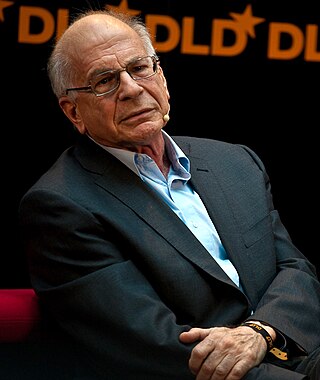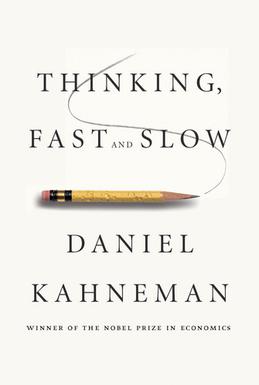Related Research Articles

A cognitive bias is a systematic pattern of deviation from norm or rationality in judgment. Individuals create their own "subjective reality" from their perception of the input. An individual's construction of reality, not the objective input, may dictate their behavior in the world. Thus, cognitive biases may sometimes lead to perceptual distortion, inaccurate judgment, illogical interpretation, and irrationality.
Bounded rationality is the idea that rationality is limited when individuals make decisions, and under these limitations, rational individuals will select a decision that is satisfactory rather than optimal.

Daniel Kahneman is an Israeli-American psychologist and economist notable for his work on the psychology of judgment and decision-making, as well as behavioral economics, for which he was awarded the 2002 Nobel Memorial Prize in Economic Sciences. His empirical findings challenge the assumption of human rationality prevailing in modern economic theory.

Amos Nathan Tversky was an Israeli cognitive and mathematical psychologist and a key figure in the discovery of systematic human cognitive bias and handling of risk.

Behavioral economics studies the effects of psychological, cognitive, emotional, cultural and social factors in the decisions of individuals or institutions, and how these decisions deviate from those implied by classical economic theory.

Prospect theory is a theory of behavioral economics and behavioral finance that was developed by Daniel Kahneman and Amos Tversky in 1979. The theory was cited in the decision to award Kahneman the 2002 Nobel Memorial Prize in Economics.
Econometrica is a peer-reviewed academic journal of economics, publishing articles in many areas of economics, especially econometrics. It is published by Wiley-Blackwell on behalf of the Econometric Society. The current editor-in-chief is Guido Imbens.

Loss aversion is a psychological and economic concept which refers to how outcomes are interpreted as gains and losses where losses are subject to more sensitivity in people's responses compared to equivalent gains acquired. Kahneman and Tversky (1992) have suggested that losses can be twice as powerful, psychologically, as gains. When defined in terms of the utility function shape as in the Cumulative Prospect Theory (CPT), losses have a steeper utility than gains, thus being more "painful" than the satisfaction from a comparable gain as shown in Figure 1. Loss aversion was first proposed by Amos Tversky and Daniel Kahneman as an important framework for Prospect Theory - an analysis of decision under risk.
Status quo bias is an emotional bias; a preference for the maintenance of one's current or previous state of affairs, or a preference to not undertake any action to change this current or previous state. The current baseline is taken as a reference point, and any change from that baseline is perceived as a loss or gain. Corresponding to different alternatives, this current baseline or default option is perceived and evaluated by individuals as a positive.
In psychology and behavioral economics, the endowment effect is the finding that people are more likely to retain an object they own than acquire that same object when they do not own it. The endowment theory can be defined as "an application of prospect theory positing that loss aversion associated with ownership explains observed exchange asymmetries."

Richard H. Thaler is an American economist and the Charles R. Walgreen Distinguished Service Professor of Behavioral Science and Economics at the University of Chicago Booth School of Business. In 2015, Thaler was president of the American Economic Association.

Mental accounting is a model of consumer behaviour developed by Richard Thaler that attempts to describe the process whereby people code, categorize and evaluate economic outcomes. Mental accounting incorporates the economic concepts of prospect theory and transactional utility theory to evaluate how people create distinctions between their financial resources in the form of mental accounts, which in turn impacts the buyer decision process and reaction to economic outcomes. People are presumed to make mental accounts as a self control strategy to manage and keep track of their spending and resources. People budget money into mental accounts for savings or expense categories. People also are assumed to make mental accounts to facilitate savings for larger purposes. Mental accounting can result in people demonstrating greater loss aversion for certain mental accounts, resulting in cognitive bias that incentivizes systematic departures from consumer rationality. Through increased understanding of mental accounting differences in decision making based on different resources, and different reactions based on similar outcomes can be greater understood.
In economics, money illusion, or price illusion, is a cognitive bias where money is thought of in nominal, rather than real terms. In other words, the face value of money is mistaken for its purchasing power at a previous point in time. Viewing purchasing power as measured by the nominal value is false, as modern fiat currencies have no intrinsic value and their real value depends purely on the price level. The term was coined by Irving Fisher in Stabilizing the Dollar. It was popularized by John Maynard Keynes in the early twentieth century, and Irving Fisher wrote an important book on the subject, The Money Illusion, in 1928.
In prospect theory, the pseudocertainty effect is the tendency for people to perceive an outcome as certain while it is actually uncertain in multi-stage decision making. The evaluation of the certainty of the outcome in a previous stage of decisions is disregarded when selecting an option in subsequent stages. Not to be confused with certainty effect, the pseudocertainty effect was discovered from an attempt at providing a normative use of decision theory for the certainty effect by relaxing the cancellation rule.
The Allais paradox is a choice problem designed by Maurice Allais (1953) to show an inconsistency of actual observed choices with the predictions of expected utility theory. Rather than adhering to rationality, the Allais paradox proves that individuals rarely make rational decisions consistently when required to do so immediately. The independence axiom of expected utility theory, which requires that the preferences of an individual should not change when altering two lotteries by equal proportions, was proven to be violated by the paradox.
The disposition effect is an anomaly discovered in behavioral finance. It relates to the tendency of investors to sell assets that have increased in value, while keeping assets that have dropped in value.
Reference class forecasting or comparison class forecasting is a method of predicting the future by looking at similar past situations and their outcomes. The theories behind reference class forecasting were developed by Daniel Kahneman and Amos Tversky. The theoretical work helped Kahneman win the Nobel Prize in Economics.

Peter McGraw is an American professor of marketing and psychology at the University of Colorado Boulder. As a behavioral scientist his research spans the fields of judgment and decision making, emotion, affect, mood, and behavioral economics.

Thinking, Fast and Slow is a 2011 popular science book by psychologist Daniel Kahneman. The book's main thesis is a differentiation between two modes of thought: "System 1" is fast, instinctive and emotional; "System 2" is slower, more deliberative, and more logical.

Eldar Shafir is an American behavioral scientist, and the co-author of Scarcity: Why Having Too Little Means So Much. He is the Class of 1987 Professor in Behavioral Science and Public Policy; Professor of Psychology and Public Affairs at Princeton University Department of Psychology and the Princeton School of Public and International Affairs, and Inaugural Director of Princeton’s Kahneman-Treisman Center for Behavioral Science and Public Policy,.
References
- ↑ "David Gal". UIC Business - University of Illinois at Chicago. 2015-08-13. Retrieved 2018-11-13.
- ↑ "Opinion | Why Is Behavioral Economics So Popular?" . Retrieved 2018-11-13.
- ↑ Ritholtz, Barry (August 9, 2018). "A Challenge to the Biggest Idea in Behavioral Finance". Bloomberg. Retrieved November 13, 2018.
- ↑ Gal, David. "Why the Most Important Idea in Behavioral Decision-Making Is a Fallacy". Scientific American Blog Network. Retrieved 2018-11-13.
- ↑ Markey-Towler, Brendan. "Explainer: what is loss aversion and is it real?". The Conversation. Retrieved 2018-11-13.
- ↑ "Do Losses Truly Hurt More Than Gains Feel Good?". Nerd's Eye View | Kitces.com. 2018-01-24. Retrieved 2018-11-13.
- ↑ "Academics dispute challenge to loss-aversion theory | Professional Planner". Professional Planner. 2018-02-06. Retrieved 2018-11-13.
- ↑ "Home | David Gal". Home | David Gal. Retrieved 2018-11-13.
- ↑ "David Gal". UIC Business - University of Illinois at Chicago. 2015-08-13. Retrieved 2018-11-13.
- ↑ "David Gal". UIC Business - University of Illinois at Chicago. 2015-08-13. Retrieved 2018-11-13.
- ↑ Brooks, David. "Opinion | Social Science Palooza" . Retrieved 2018-11-13.
- ↑ "Week in Ideas: Christopher Shea". WSJ. Retrieved 2018-11-13.
- ↑ "Concerned with looking tough, men opt for macho grub | The Star". thestar.com. Retrieved 2018-11-13.
- ↑ White, Martha C. "The Verdict Is In: Tackle Smaller Debts First". Time. ISSN 0040-781X . Retrieved 2018-11-13.
- ↑ "You Experience a Silent Rage After Exerting Self-Control". Harvard Business Review. 2013-05-21. Retrieved 2018-11-13.
- ↑ "Dumb, blond ad; An unlikely alliance; and bias" . Retrieved 2018-11-13.
- ↑ "David Gal". UIC Business - University of Illinois at Chicago. 2015-08-13. Retrieved 2018-11-13.
- ↑ "David Gal". UIC Business - University of Illinois at Chicago. 2015-08-13. Retrieved 2018-11-13.
- ↑ Kahneman, Daniel; Tversky, Amos (1979). "Prospect Theory: An Analysis of Decision under Risk". Econometrica. 47 (2): 263–291. CiteSeerX 10.1.1.407.1910 . doi:10.2307/1914185. JSTOR 1914185.
- ↑ "[15] Citing Prospect Theory". Data Colada. 2014-02-10. Retrieved 2018-11-13.
- ↑ Kahneman, Daniel (2011). Thinking, Fast and Slow. New York: Macmillan. p. 300. ISBN 978-1-4299-6935-2.
- ↑ The Committee for the Prize in Economic Sciences in Memory of Alfred Nobel (October 9, 2017). "RICHARD H. THALER: INTEGRATING ECONOMICS WITH PSYCHOLOGY" (PDF). Nobelprize.org. Retrieved November 13, 2018.
- ↑ Gal, David (July 2006). "A Psychological Law of Inertia and the Illusion of Loss Aversion" (PDF). SJDM.ORG. Retrieved November 13, 2018.
- ↑ Gal, David; Rucker, Derek D. (2018-04-20). "The Loss of Loss Aversion: Will It Loom Larger Than Its Gain?". Journal of Consumer Psychology. 28 (3): 497–516. doi: 10.1002/jcpy.1047 . ISSN 1057-7408. S2CID 148956334.
- ↑ "Opinion | Why Is Behavioral Economics So Popular?" . Retrieved 2018-11-13.